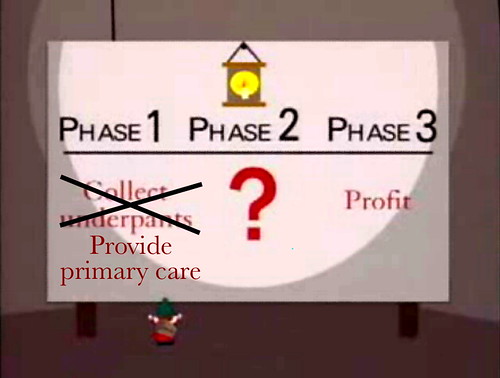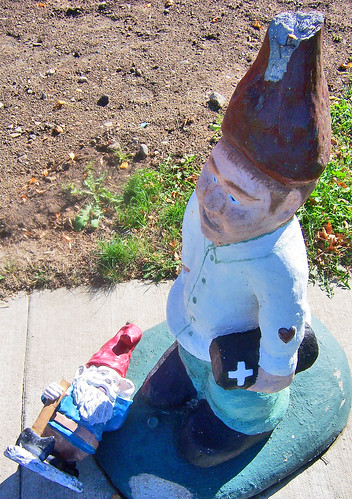--W. Edwards Deming
“The superior doctor prevents sickness; The mediocre doctor attends to impending sickness; The inferior doctor treats actual sickness.” --Ancient Chinese quotation
I haven't been posting regularly for a while because, well, it takes a lot of work to keep up a blog. I mean, I do have a day job. And that day job has changed a little.
I started this blog on September 25, 2003 in order to "chronicle my attempt to replicate what family practitioner Dr. Gordon Moore has pioneered in his "solo-solo practice" (Going Solo: Making the Leap) in the hopes of regaining some control and sanity in my professional (and personal) life" and to "help anyone else who might be attempting the same
I am as surprised as anyone that this blog has survived. For those of you who are considering, or have started your own medical blogs, know that, like everything else in life, medical blogging is not without risks.
For those who are interested in starting your own solo micropractice, there are risks, too, but I still think it is possible under the right conditions and with a lot of help.
I am still a solo family doctor. I started off as a solo-solo operation (aka the Gordon Moore model) about 5 1/2 years ago, in February 2004, and have been trying to figure out how to make this thing work for me and my patients ever since. I signed up with a bunch of PPO insurance plans and Medicare, but chose to avoid Medicaid and HMO because of the low reimbursement/high hassle factor.
What have I learned?
1. Submitting claims to insurance companies is easy, but collecting payment from them is sometimes very, very difficult, and in some cases, impossible.
2. The more time you spend with a patient, the more there is to document in the progress note.
3. Perfect progress notes are the enemy of timely progress notes.
4. EMRs don't save time in charting, but they do when retrieving notes.
5. There is no perfect EMR so get the cheapest one that does what you need it to do.
6. The ideal personality to run a solo-solo office is someone who is either in a permanent manic phase or who has the energy of a hyperactive kid on Pixy Stix and caffeine.
7. I live in a "dead zone", an area with conditions (in my case, high cost of living and low insurance reimbursement) that makes it very difficult, if not impossible, for an Ideal Medical Practice to survive.
8. The fixed low reimbursement of primary health care coupled with relatively high expenses means that the current American Healthcare System forces primary care doctors to continue following the business plan of the Underpants Gnomes:

Phase 1: Provide primary care (or collect underpants, your choice)It's that Phase 2 part that's killing off primary care.
Phase 2: ???
Phase 3: $Profit$!
Changes I have made in my practice since 2004:
1. I got a part-time biller. My first biller was a lifesaver for me in that she is able to follow up on denied and "forgotten" claims that I didn't have the time or energy for. I call her my "pitbull" because once she gets hold of a claim, she doesn't let go until they pay up or all options have been exhausted. She has since moved on due to other obligations, and I have a new biller who is still learning the ropes. Still, it is better than when I was submitting (or not submitting) claims on my own.
2. Changed my practice name from a "Family Practice" to "Family Medicine". I should have done this at the very beginning, but that was right around the time that AAFP was changing our specialty name and I guess I didn't have the foresight to see what a hassle it would be later to change business cards, stationary, phone book listings, insurance contracts, etc. People still aren't really sure what Family Medicine is, but it's better than being confused for a daycare center.
3. I opted out of Medicare. I had been thinking about opting out of Medicare for a long time, basically ever since I opened my solo practice. Medicare's reimbursement level was low but usually no lower than the PPO payers and sometimes even higher than them, which is pretty depressing. They usually paid quickly and it wasn't that difficult to talk to a live person when we had a problem. But after my first 3 years in practice, only 4% of my patients had Medicare.
My main concern with Medicare has always been about accidentally running afoul of Medicare regulations and being tossed in jail or fined. When you first enroll with Medicare, they send you a CD with their rules and regulations. I have never opened that CD. In book form, it is over 500 pages long.
Medical coding is probably 2nd only to income tax calculations in complexity. In a study with 300 coding experts given 6 hypothetical cases to code, there was only 57% agreement on the correct E/M code. And this was with coding experts. It's got to be even worse when physicians do it but as physicians, we are ultimately responsible for any errors.
Medicare can fine you if you waive a patient's copay. They even sell Medicare supplemental fraud insurance in case you get hauled in. Under the False Claims Act, you can be fined up to $11,000 per claim and liable for 3 times the actual damages. Kind of like having a rich, beautiful and famous girlfriend who will cut your arm off because you didn't compliment her new shoes.
And while I realize that the few horror stories are rare and unlikely to ever affect me, they were enough to make me question, as for this physician, whether I should continue taking Medicare. Since dropping Medicare wouldn't affect my income significantly, I decided it wasn't worth it for me so I opted out.
4. I started charging an extra fee to help me survive the dead zone. More on this next time.
So anyways, both my practice and this blog are not dead yet.
In fact, I'm a lot happier and more satisfied as a physician, with the freedom to practice medicine the way I was trained to. I have the flexibility to pick up my kids from school every day and drive them to get braces, or wait for the plumber, or run errands. I don't make as much as I used to at Kaiser, but my income has been growing every year and I anticipate it will keep growing.
One of the reasons I went into medicine was because I knew I didn't want to go into business. But when I got into medicine, I discovered that it had turned into big business. So I started my own business to rediscover the art of medicine. Funny how that worked out, huh?



